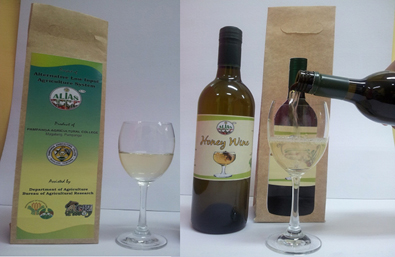Parties are definitely all over the place during Yuletide season. As some would say, every celebration is never complete without any liquor on a shot glass to say “cheers” with. No wonder imported wine is one of the best buy Christmas presents in supermarkets and liquor shops. However, researchers and other businessmen have explored the potentials of underutilized fruits and other commodities as raw materials in producing wines. Hence, consumers started to be curious and eventually patronized the locally-made wines.

Through the National Technology Commercialization Program (NTCP) of the Bureau of Agricultural Research (BAR), various stakeholders from the research stations of the Department of Agriculture (DA) and state universities and colleges (SUCs) were able to produce a variety of wines made from bignay, lipote, abiu, rambutan, pineapple, mango, guyabano, ybanag, arius, sapinit, duhat, tamarind, tambis, and sweet potato. The latest addition is wine from honey.
The Drink of love
Honey wine, also known as mead, is considered as the first alcoholic drink brewed by men, earlier than wine or beer, with alcohol level varying between7-15 percent. In Europe, honey is fermented to produce this beverage, thus, it was also called the “Nectar of the Gods” or “Drink of Love”.
It was told that honey wine could have been produced by chance during the Stone Age when honey became wet from rain and wild yeast in the air settled into the mixture. For centuries, honey wine is widely-known as an aphrodisiac. In fact, the word “honeymoon” is believed to be derived from the ancient European custom of having newly-weds drink honey wine for a month in order to increase their fertility.
Honey wine is also taken as a health tonic drink as it has a good level of antioxidants. B-vitamins are also present which is a good energy booster. Another advantage of honey wine is it contains no gluten and therefore can be enjoyed by people with celiac disease or wheat sensitivities.
Imported honey wines are indeed expensive which ranges from US $10-30. In the case Philippines, honey wine is being sold to cater the high-end consumers.
PAC’s Newest Pride
From patronizing tamarind as their flagship commodity, the Pampanga Agricultural College (PAC) has begun to explore the market potentials of honey wine by producing their own.
According to Dr. Norman de Jesus of the Alternative Low Input Agriculture System Center (ALIAS Center) and professor at the Institute of Agriculture Systems and Technology Center of PAC, the selection of honey followed the standard guidelines. Honey wine processing is a series of confirmation steps specifically the racking, clarification and aging wherein the fermented mixture is being measured based on its alcohol reading, pH, degree brix and organoleptic test and have it transferred to another vessel.
PAC’s honey wine was raised following organic production systems or guidelines and is organically certified by Ecoland as the second party certifying body and Negros Island Certification Services (NICERT) as the third party certifying body.
“Honey wine is more on the sweet category. Whereas the commercially available honey wine is more on the dry side,” explained Dr. de Jesus. PAC’s Honey Wine is economically priced at PhP 200 per 750 ml.
To produce a wide variety of choices for its target consumers as well as to make the product as part of the income generating projects, the academe is planning to produce honey wine infused with herbs such as mint, basil, tarragon, and oregano with tamarind. When asked about their tagline for the product, Dr. de Jesus was proud to say that PAC’s version of honey wine came from “Honey from Mt. Arayat”. ### (Liza Angelica D. Barral)
———-
For more information, please contact:
Norman de Jesus, PhD
Director, Alternative Low Input Agriculture System Cluster (ALIAS)
Professor IV, Institute of Agriculture System and Technology
Pamapanga Agricultural College (PAC)
Magalang, Pamapanga
Tel. No. (045) 343-4394
Cel No. 09285502561
Email: normandejesus2005@yahoo.com
Source: http://www.bar.gov.ph

nice honey wine 🙂
http://lembestlechon.com